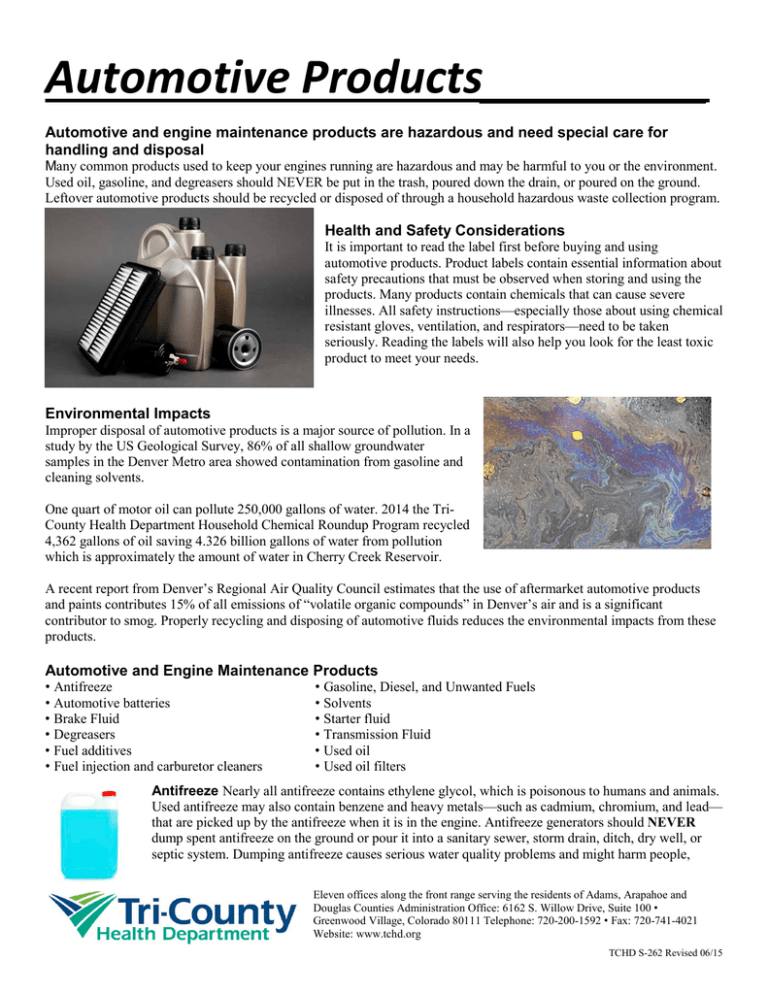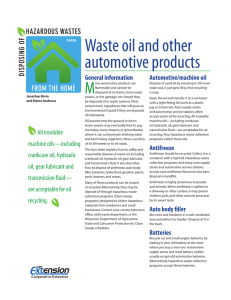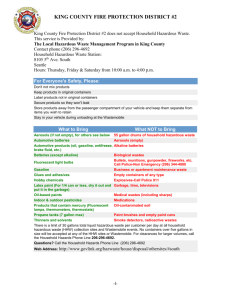Auto Waste Fact Sheet - Tri
advertisement

Automotive Products_________ Automotive and engine maintenance products are hazardous and need special care for handling and disposal Many common products used to keep your engines running are hazardous and may be harmful to you or the environment. Used oil, gasoline, and degreasers should NEVER be put in the trash, poured down the drain, or poured on the ground. Leftover automotive products should be recycled or disposed of through a household hazardous waste collection program. Health and Safety Considerations It is important to read the label first before buying and using automotive products. Product labels contain essential information about safety precautions that must be observed when storing and using the products. Many products contain chemicals that can cause severe illnesses. All safety instructions—especially those about using chemical resistant gloves, ventilation, and respirators—need to be taken seriously. Reading the labels will also help you look for the least toxic product to meet your needs. Environmental Impacts Improper disposal of automotive products is a major source of pollution. In a study by the US Geological Survey, 86% of all shallow groundwater samples in the Denver Metro area showed contamination from gasoline and cleaning solvents. One quart of motor oil can pollute 250,000 gallons of water. 2014 the TriCounty Health Department Household Chemical Roundup Program recycled 4,362 gallons of oil saving 4.326 billion gallons of water from pollution which is approximately the amount of water in Cherry Creek Reservoir. A recent report from Denver’s Regional Air Quality Council estimates that the use of aftermarket automotive products and paints contributes 15% of all emissions of “volatile organic compounds” in Denver’s air and is a significant contributor to smog. Properly recycling and disposing of automotive fluids reduces the environmental impacts from these products. Automotive and Engine Maintenance Products • Antifreeze • Automotive batteries • Brake Fluid • Degreasers • Fuel additives • Fuel injection and carburetor cleaners • Gasoline, Diesel, and Unwanted Fuels • Solvents • Starter fluid • Transmission Fluid • Used oil • Used oil filters Antifreeze Nearly all antifreeze contains ethylene glycol, which is poisonous to humans and animals. Used antifreeze may also contain benzene and heavy metals—such as cadmium, chromium, and lead— that are picked up by the antifreeze when it is in the engine. Antifreeze generators should NEVER dump spent antifreeze on the ground or pour it into a sanitary sewer, storm drain, ditch, dry well, or septic system. Dumping antifreeze causes serious water quality problems and might harm people, Eleven offices along the front range serving the residents of Adams, Arapahoe and Douglas Counties Administration Office: 6162 S. Willow Drive, Suite 100 • Greenwood Village, Colorado 80111 Telephone: 720-200-1592 • Fax: 720-741-4021 Website: www.tchd.org TCHD S-262 Revised 06/15 and/or animals. The best way to dispose of antifreeze is to recycle it or dispose of it through a household hazardous waste collection program. Check with your sanitation district to identify the nearest antifreeze recycler. Do not mix antifreeze with used oil, because it is difficult to properly dispose of mixed products. Spills If you spill antifreeze, put kitty litter or another absorbent down to soak it up, discard, and rinse the area with water. Use gloves to prevent skin contact. Auto and Vehicle Batteries Automotive and vehicle batteries contain lead and sulfuric acid, both of which are hazardous. The U.S. Consumer Product Safety Commission (CPSC) estimates approximately 3,700 people a year are taken to the hospital to be treated for burns from batteries, 20% of which are children under the age of 16. Make sure you handle batteries carefully—preferably with chemical resistant gloves and eye protection—and store them away from fire, sparks, open flames, and sources of moisture to reduce the risk of chemical burns. Automotive and other vehicle batteries can be recycled at most local auto parts stores. More than 90% of lead-acid batteries are recycled, and new batteries contain 60%-80% recycled materials. Used Oil Used oil is a valuable resource—if you recycle just two gallons of used oil, the oil can generate enough electricity to run the average household for almost 24 hours. The reason you change the oil in vehicles, is it becomes contaminated and needs to be cleaned. Used oil can be re-refined into good-as-new condition and can be reused as lubricating oil. Oil never wears out. Most auto parts stores and many service stations will accept used oil for recycling. You can find locations by visiting www.earth911.com or calling 1-800-CLEANUP (1-800-253-2687). Many household hazardous waste collection programs also collect used oil. Used oil should never be put in the trash, poured down the drain, or poured on the ground. Motor oil, transmission fluid, brake fluid, and lubricating oils for the crankcase, transmission, gearbox, or differential are all considered “used oil”. Do not mix other wastes with motor oil. Once contaminated with other substances, the oil becomes difficult or impossible to recycle. Gasoline, fuels, fuel additive, solvents, and flammable degreasers Despite its common occurrence and use, gasoline is one of the most dangerous substances found around the home. It is both highly flammable and extremely toxic. For this reason, gasoline should never be poured down the drain, poured on the ground, or thrown in the trash. Gasoline should not be used as a solvent. Gasoline, diesel, kerosene, and other unwanted fuels, solvents, and flammable degreasers can be disposed of through your local household hazardous waste collection program. Aerosol Cans Aerosol cans containing propellant are explosive if crushed or incinerated, and should not be placed in the trash. If you no longer hear any hissing when you press the nozzle, the can is empty and may be recycled or thrown away. If you need to get rid of a non-hazardous, non-flammable product in an aerosol can, you may empty it by discharging the contents into a cardboard box or paper bag while outdoors and in a well-ventilated area. Full or partially empty aerosol cans should be disposed of through a household hazardous waste collection program. For more information about responsible disposal, contact: • Tri-County Health Department’s Household Chemical Information Hotline at (303) 846-6249 or http://www.tchd.org/250/Home-Chemical-Waste • Earth’s 911: The Environmental Hotline at 1-800-CLEANUP or www.earth911.com • Health & Safety Information on Household Products (National Institutes of Health)http://householdproducts.nlm.nih.gov • Colorado Department of Public Health and Environment at 303-692-3320 https://www.colorado.gov/pacific/cdphe/hhw Eleven offices along the front range serving the residents of Adams, Arapahoe and Douglas Counties Administration Office: 6162 S. Willow Drive, Suite 100 • Greenwood Village, Colorado 80111 Telephone: 720-200-1592 • Fax: 720-741-4021 Website: www.tchd.org TCHD S-262 Revised 06/15


